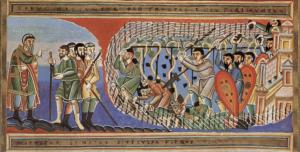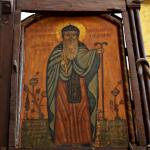
“Be watchful, stand firm in your faith, be courageous, be strong. Let all that you do be done in love” (1 Cor. 16:13-14 RSV). Love is central to the Christian faith. Love inspires us. It strengthens us. It gives us courage when we need it. We can stand firm in our faith because of it, but if we do not have it, then our faith can weaken, leading us to reject doing what Christ would have us do.
Of course, when talking about strength and courage, we must not be confused. We must not think of them in the wrong way. We must not use them for selfish gain. If we do, then we do not possess the strength which is found in love, and so the strength is not the strength found with faith. The strength and courage which we should seek are those which allow us to push on and put into practice the teachings of the faith, to care for others and seek their good even if it means some kind of sacrifice on our part. That is the strength which we need, the strength which allows us to persevere in virtue, as well as the courage to hold to the truth even when we have reason to fear it will not be easy to do what needs to be done. And all of these come to us when we embrace love. Love allows us to do many great and difficult things which we would not be able to, nor be willing to do, without it. For, as St. John Chrysostom surmised, “love is the beginning and the end of every virtue.”[1]
We must recognize that the greatness of love is found first and foremost in God, because he is love (cf. 1Jn. 4:8). God’s love is infinite, so his virtue is infinite, and his strength and power is infinite. This is demonstrated in the incarnation. The infinite love of God allowed the Logos, the Son of God, to become man, to empty himself of all pretense of strength and power, to let himself be taken in by humanity, dragged to the cross, and be executed. Selfishness, hate, abuse, all of these will come to an end, as they did for Jesus on the cross. But, as we see in the resurrection, God’s love has no end; it transcends the hate and violence which would try to wipe it out. Love, even in its kenotic emptiness, remains infinitely great and powerful enough not only to revive that which was wounded because of hate, but to transfigure it, bringing it into glory. In the resurrection, the love of God is shown triumphant. And so we are also to realize, the hate of sin which would destroy us, the hate which would destroy the world around us, likewise will come to an end, and all that has been harmed by it can be and will be restored and transfigured by the cosmic work of Christ. For Christ shows us that the love of God dwells in and with all things, raising them up beyond any and all contamination they experienced due to sin.
And so, Jesus, in his love, reminds us of the love of God for humanity through a parable which reflects not only his work, but the work of those who came before him:
“Hear another parable. There was a householder who planted a vineyard, and set a hedge around it, and dug a wine press in it, and built a tower, and let it out to tenants, and went into another country. When the season of fruit drew near, he sent his servants to the tenants, to get his fruit; and the tenants took his servants and beat one, killed another, and stoned another. Again he sent other servants, more than the first; and they did the same to them. Afterward he sent his son to them, saying, `They will respect my son.’ But when the tenants saw the son, they said to themselves, `This is the heir; come, let us kill him and have his inheritance.’ And they took him and cast him out of the vineyard, and killed him. When therefore the owner of the vineyard comes, what will he do to those tenants?” They said to him, “He will put those wretches to a miserable death, and let out the vineyard to other tenants who will give him the fruits in their seasons.” Jesus said to them, “Have you never read in the scriptures: `The very stone which the builders rejected has become the head of the corner; this was the Lord’s doing, and it is marvelous in our eyes’ (Matt. 21:33-42 RSV).
Creation is the vineyard of God, and God has sent many stewards to guide and protect it. The vineyard and his servants have been unjustly attacked and harmed by those possessed by hate. But the vineyard continues to be looked after. God desires his will to be done on earth as it is in heaven, that is, he seeks creation to be freed from the defilements of sin. Those who were rejected and abused have found their place with God. Jesus shows us that they have a glorious place in the new creation. The cornerstone of the new creation is Christ himself, God-the-Son. Upon him, all people, places, and things will find a home.
We must follow the path of love. We must place our love upon Jesus; then, with such love, we will connect with him and find our place in the new creation. If not, we risk being tossed aside and accursed (cf. 1 Cor. 16:22). So long as we reject love, we will not feel at home in the new creation. But once we conform to love, then all that will change. We will be united to Jesus, who, as the cornerstone, connects all humanity together. We will join together with those who we once thought were our enemies. We will be reconciled with them as we find our love is indeed greater than the hate which we once possessed. This, St. Hilary of Poitiers suggested, can be found in the way Jesus combined the people of Israel with the Gentiles: “Finally the Son is himself the stone which has been rejected by the builders but erected as the cornerstone and is marvelous in the eyes of all. Between the Law and the pagans, he is the conjunction of both buildings.”[2]
God is love, and in that love, he establishes not only the means of the new creation, but the pattern for it as well. Love is the blueprint which God uses. Love is the form which he wants to see in us, because when we conform ourselves to it. we reveal ourselves to truly be in the image and likeness of God. Where love is, there is the strength to persevere, the strength needed to be a part of the new creation, to be a part of the everlasting kingdom of God. With such love, we can truly stand firm in the faith, but without it, we will find our faith is weak, and crumbles away when challenged by the hate in our hearts.
[1] St. John Chrysostom, On the Incomprehensible Nature of God. Trans. Paul W. Harkins (Washington, DC: CUA Press, 1982), 269 [Homily 10].
[2] St. Hilary of Poitiers, Commentary on Matthew. Trans. D.H. Williams (Washington, DC: CUA Press, 2012), 230.
Stay in touch! Like A Little Bit of Nothing on Facebook.
If you liked what you read, please consider sharing it with your friends and family!













